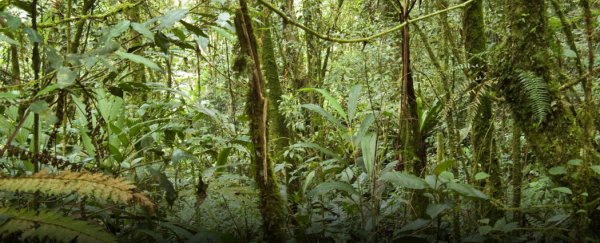A new study by NASA researchers has calculated that tropical forests around the world are absorbing 1.4 billion metric tonnes of carbon dioxide out of a total of 2.5 billion. This beats the absorption rate of the expansive boreal forests of the world's northern regions, including Siberia and Canada, believed for the past 25 years to be the top carbon dioxide absorbers.
"This is good news, because uptake in boreal forests is already slowing, while tropical forests may continue to take up carbon for many years," lead author David Schimel, from NASA's Jet Propulsion Laboratory in the US, said in a press release.
Forests and other forms of terrestrial vegetation are responsible for sucking 30 percent of human-produced carbon dioxide out of the atmosphere as a result of photosynthesis, and we rely on this. If that 30 percent was to drop even a little, we'd be in big trouble - the rate of global warming would increase in response, so to find that tropical forests are doing an even better job than we thought is some pretty great news.
But figuring it out was no easy task. "Feedbacks from terrestrial ecosystems to atmospheric CO2 concentrations contribute the second-largest uncertainty to projections of future climate," the team writes in the Proceedings of National Academy of Sciences. "These feedbacks, acting over huge regions and long periods of time, are extraordinarily difficult to observe and quantify directly."
So Schimel and his colleagues pulled together a number of different sources based on varying scales to compare carbon dioxide absorption estimates, including computer models of atmospheric and ecological processes, satellite images, and data collected from experimental forest plots that have been planted around the world for research purposes. Using these, they were able to trace the rate of carbon dioxide absorption backwards to figure out where today's concentrations of carbon dioxide have come from.
Using this information, they were able to compare and validate existing, ground-based measurements to come up with the most accurate calculation yet, which revealed that tropical forests are doing a better job at carbon dioxide absorption than we thought.
"Until our analysis, no one had successfully completed a global reconciliation of information about carbon dioxide effects from the atmospheric, forestry and modelling communities," said one of the team, Joshua Fisher from NASA's Jet Propulsion Laboratory, in the press release. "It is incredible that all these different types of independent data sources start to converge on an answer."
Interestingly, while the threats of logging and deforestation are ever-present, forests do actually benefit from one of humanity's bad habits. As we continue to pour more carbon dioxide into the atmosphere, we're actually feeding the forests, and allowing them to grow faster. The process is known as 'carbon fertilisation', and the effect appears to be stronger in the warmer regions of the globe, says Schimel, which could be why tropical forests are out-performing the colder boreal forests, also known as snowforests.
"What we've had up till this paper was a theory of carbon dioxide fertilisation based on phenomena at the microscopic scale and observations at the global scale that appeared to contradict those phenomena," Schimel says in the press release. "Here, at least, is a hypothesis that provides a consistent explanation that includes both how we know photosynthesis works and what's happening at the planetary scale."
So that's the good news, but here's the bad - as climate change continues to increase global temperatures, this leads to a decrease in water availability. This, in turn, has caused instances of bushfires to become bigger and more frequent, and those deliberately lit for deforestation purposes aren't helping. Not only do these fires kill off the trees, but they also expel huge amounts of carbon dioxide into the atmosphere, the removal of which really relies on those trees still existing.
Deforestation is why we can't have nice things.
Source: NASA's Jet Propulsion Laboratory
